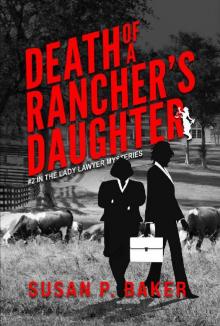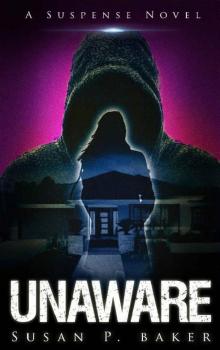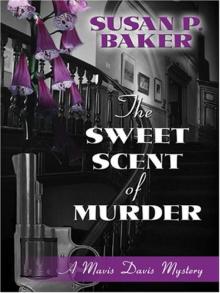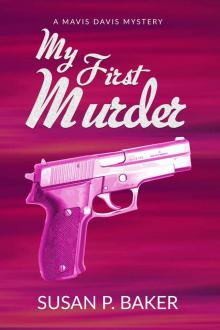- Home
- Susan P. Baker
Death of a Rancher's Daughter Page 21
Death of a Rancher's Daughter Read online
Page 21
Dressed in a black pin-striped suit, Mr. Holt was striking with his dark-framed glasses, piercing hazel eyes, lock of hair hanging above one eye, and well-trimmed beard. He'd just finished his voir dire. After explaining the definition of first-degree murder, he'd spent most of his allotted time making sure no one on the panel knew the defendant, as he called Rufina. The defendant this. The defendant that. And, of course, he asked whether anyone knew the defendant's attorneys, Sandra or Erma. The likelihood of that was slim, but prosecutors seldom took chances. He'd been able to exclude a few jurors who knew BJ, and who stated they couldn't be impartial.
Holt had tried to lay out his case-in-chief for the panel, but Sandra objected loud and long, only reining herself in when he questioned them about whether they could convict a woman of murder. Could they give ninety-years to a woman? He pressed them on circumstantial evidence. Could they convict on circumstantial evidence if the State had no more than that? Could they convict if the State showed there were means, motive, and opportunity?
Now, it was her turn. Her eyes ran across the predominately white faces. “Good morning, ladies and gentlemen. Since the parties in this case have already been introduced, let me just say I appreciate your showing up to perform your service. Without you, Mrs. Rufina Barboza, my client, wouldn't be able to have her day in court. Now then, juror number one, Mr. Schultz, would you describe what you see when you look at Mrs. Barboza?”
Rufina, who'd worn a scarf around her head and kept only her profile visible to the jury panel as much as possible, removed the scarf and turned, so they could see her full face. Her long, gray-streaked black hair was knotted at the back of her head, revealing scarring all the way into her scalp. She wore a long-sleeved, white blouse with a collar open at the neck, showing scars down to the first button, and a short string of pearls, both of which contrasted with her dark skin. Her black pencil skirt fell to her ankles, just above black flats. She stood when Sandra indicated, thereby emphasizing Sandra's height and her own tiny stature. Part of the plan.
Juror number one, a short, thin man with a crew-cut, winced. Sandra focused on him, but with her peripheral vision, she saw juror number two's face scrunch up. Tears filled the woman's eyes.
Erma and Mel took furious notes, Erma, from the counsel table, Mel, from a chair the judge had allowed them to put almost behind the clerk's box. At pretrial, Sandra and Holt had a brief skirmish over a minor's being allowed in front of the bar. The judge hadn't seen the harm in it, so they'd won a small battle at least. Sandra needed Mel's impressions of the panel. Erma could only look at so many people at one time.
After a pause of several moments, Sandra again asked, “What do you see?”
A muscle pulsed in the man's jaw. He squirmed and sat up straighter. “A very dark, little Mexican woman with a terribly scarred face.”
Sandra liked that answer, especially the 'little'. She turned to juror number two. “And ma'am,” she read the woman's name from the jury list, “Ms. Coffey, please describe what you see.”
Sandra continued that line of questioning all the way to the last person in the pool. Her intention had been to make sure the potential jurors saw how small Rufina was, as well as to see whether any of them shied away from looking at her.
“Now, raise your hand if you think Mrs. Rufina Barboza is guilty of the crime with which she is charged, the crime the prosecutor already told you about.” Sandra's eyes met those of each person. No hands went up.
“That's right. Rufina's been charged with a crime, but she has not been found guilty. Any of you have a problem with that?”
The panel shook their heads.
“Let the record reflect the panel as a group shook their heads no. Juror number three, Mr. Shineberger, what is an indictment?”
Mr. Shineberger, who was a head taller than everyone in his row, wore a dark blue suit. On the jury list, his occupation was listed as bank vice-president. He frowned at Sandra, his black eyebrows drawing together. Bankers were notoriously conservative, so here she had a conservative man in a conservative profession in a conservative town. She didn't want him.
He scrutinized her body a moment too long for her taste. He appeared to be at least sixty. “An indictment says a Grand Jury has decided there's probable cause to have the person stand trial for a crime.”
Sandra cocked her head. “You've served on a Grand Jury, haven't you?”
He nodded and gave her a fake smile.
“You didn't serve on the Grand Jury that indicted my client, did you?” She thought she was making a small joke.
“Yes, ma'am.” Something akin to a smirk danced around his mouth.
Tiny shock waves shot up Sandra's arms. What the hell? She turned to the judge. “May we approach the bench?”
“You certainly may,” the judge said.
“Mr. Shineberger, if you'll accompany us for a word with the judge, please?” She opened the swinging door that separated the potential jurors from the lawyers, so he could walk through.
When they reached sidebar, Sandra said, “Judge, move to strike Mr. Shineberger for cause.” She fought with herself to keep her hands from her hips. How had someone who had served on the Grand Jury ended up on the venire?
Mr. Holt said, “Your Honor, I have no idea how this happened. I have no objection.”
Judge Danforth said, “Mr. Shineberger, you're excused. See the clerk across the hall if you need a jury slip. Thank you for your time.”
“Thank you, Your Honor.” Sandra and Erma exchanged astonished looks as Sandra wove in-between the counsel tables until she was back in place.
Sandra drew a deep breath and let it out, hoping the jurors couldn't read the tension she felt, the questions in her mind about the case being rigged, her imagination running wild. “Did any of the rest of you serve on the Grand Jury that heard Mrs. Rufina Barboza's case?” Silence met her question. “I take it by your silence, the answer is no.”
Mr. Holt's head was down as if he were studying the names on his copy of the jury list.
Sandra made eye contact with several of the jurors at the back of the panel. The top sheet of her list of potential jurors had squares drawn and people's names filled in with their numbers on the jury panel. She crossed out Mr. Shineberger's name and flipped to the second page, to the first box, the first alternate. “Mr. Linebarger, you've moved up.” His name was too close to Mr. Shineberger's. Bergers, Bargers, all descendants of the original German settlers. What was she to do? Try not to stereotype them, she told herself.
When the venire had entered the courtroom that morning, Erma almost swallowed her tongue. She hadn't seen such a jury panel, very white and middle-aged, since her early days of practicing law. Being the suspicious sort, she wondered whether someone could have intentionally put brown people at the back, so far back they'd never have a chance to serve on the jury. As soon as they were seated, Sandra filed for a jury shuffle to try to get some color up front, so they might be able to seat one or two people who resembled their client—at least get a few within spitting distance. Judge Danforth had grudgingly granted her motion.
Even with the jury shuffle and careful strikes, the twelve who were seated didn't look all that promising. After a thin little white man, came an old German woman who spoke with an accent. Erma had noted her tear-filled eyes and had taken that as a good sign. Why hadn't Holt struck her? Did he know something they didn't? The third juror, a Latino male who Sandra and Erma thought for sure Holt would strike, could possibly lean their way. Unfortunately, the potential juror’s cell phone stayed glued to his ear during every break indicating he had other matters on his mind he thought more important than murder. The next was a rancher who smelled earthy and wore muddy cowboy boots, jeans, a snap-up shirt, and carried his hat in his hands.
Holt wore a shit-eating grin when the clerk called each name, right up to the last one—a real, live, black person seated in the number twelve chair. Erma had seen the woman but hadn't caught her name, hadn't thought the strikes wo
uld go so far back. She found her on the list. The thought that a minority woman would have some empathy for Rufina instilled hope in Erma's heart. All they needed was one vote to hang up the jury.
After a ten-minute break during which the judge excused the remainder of the panel, the jurors filed back into the jury box. Mel sat on the first wooden bench behind Sandra and Erma. BJ couldn't be in the courtroom, because she was a witness. The judge read several pages of instructions to the jury and then asked Rufina to stand. Sandra stood with her.
“How do you plead to the allegations in the indictment? Guilty or not guilty?”
Her arms at her sides, her chin up, Rufina turned toward the jury. “Not guilty.”
After announcements of ready, the judge crossed his arms and said, “Mr. Holt, you may begin.”
Holt circled around his table, the one closest to the jury, and laid several sheets of paper on one corner. “Good morning, again, ladies and gentlemen. Right off the bat I want to thank you for your jury service. As the judge told you in preliminary instructions, we expect this case to last about a week. He also explained the order in which we present our cases. As attorney for the State, for the people, I have the burden of proof. I must prove to you that the defendant—” he pointed at Rufina “—is guilty beyond a reasonable doubt. We discussed that in voir dire, so you all have a pretty good idea of what it means, right? And that is exactly what I will do.” He paused and looked at each juror.
“What we have here is a simple case of revenge or, in legal terms, retaliation. The defendant,” he turned and pointed at Rufina again, “after years and years of holding in her anger, shot and killed the young woman who was responsible for burning down the defendant's house and killing the defendant's husband. That's it, plain and simple.”
Sandra and Erma watched the jurors for their reactions and made notes. Several jurors' eyes flickered when Holt said “shot and killed” and again when he said “killing the defendant's husband,” but otherwise they all remained deadpan.
He continued. “It's my job to prove this to you. The facts are plain. On the night of the murder, the Widow Schindler had entertained at her home. All three of her children were present as well as a couple of friends of the family. The defendant, the housekeeper, supposedly went to her cottage after supervising the preparation of the evening meal. After dinner, when everyone had retired for the evening, the defendant—if she did go to her residence—returned to the Schindler home with the intention of shooting Katy Jo Schindler. However, the decedent, Katy Jo Schindler, wasn't in her room. Instead, Katy Jo had gone into her mother's room to talk with her mother. Mrs. Schindler got out of bed and went into the bathroom. At that time, the defendant ran into the bedroom and shot Katy Jo and ran away.
“The defendant ran to her cottage, which is only a short distance from the main house. In her haste, she dropped the gun alongside the path. She then undressed quickly and got into her own bed. By the time the police arrived, everyone, including the defendant, had gathered in the house, most of them still dressed in their bedclothes.”
Rufina, who had, for the most part, ignored the pad and pen Sandra had provided to her for the purpose of making notes, picked up the pen and began writing as Holt continued his statement.
“We intend to prove the defendant had means, motive, and opportunity. The means was the Schindler gun cabinet full of guns that the defendant had access to. As housekeeper, she had access to the keys to everything in the house. She supervised the cleaning of the house, including the gun cabinet.”
Rufina glanced at Sandra and mouthed the word, “No.” She wrote more. “BJ had keys to gun cabinets.”
“As for motive, the defendant had plenty. She hated Katy Jo for setting the fire that killed Mr. Barboza. Not only was her husband killed, but the defendant was horribly scarred as you have seen. We intend to show you that over the years the anger at Katy Jo built up and built up until, on the eve of Katy Jo's engagement to a nice young man who you will hear from, the defendant could no longer contain her fury. She couldn't stand the idea that Katy Jo would live the good life while she, the defendant, would live out her life as a widow and a servant.
“Lastly, opportunity. Katy Jo was at the ranch for a family dinner party. The defendant got a gun from the gun cabinet, intending to kill Katy Jo in Katy Jo's bedroom, but before she could accomplish that feat, Katy Jo went into Mrs. Schindler's room. Not wanting to lose the opportunity, the defendant followed Katy Jo, and shot her to death as soon as Mrs. Schindler left the room.”
Holt continued in that vein for a few minutes more and sat down.
The judge said, “Ms. Salinsky, do you wish to make your opening statement now or wait until you present your side of the case?”
Erma snorted under her breath. The judge was required to ask that ludicrous question. For the defense to wait to make an opening statement left the jury with nothing to think about over the course of the trial except the prosecution's theory of the case. A defense attorney would generally have to be an idiot to wait.
“I'll make my opening now, Your Honor.” Sandra walked across the courtroom to stand before the jury.
“Ladies and gentlemen of the jury, I, too, wish to thank you for your time and attention. If it weren't for you showing up to serve, Mrs. Rufina Barboza would never get her day in court. Her name would never be cleared. And so, the defense extends our utmost appreciation to you.
“You all promised in jury selection to keep an open mind. The way this works is the prosecution has the burden of proof. He,” she pointed at Holt, “gets the first and last word. As Mrs. Barboza sits here now, she is innocent of all charges against her. She's innocent until proven guilty.”
A hinge squeaked at the back of the courtroom. BJ stuck her head inside the door. She held one finger up. Erma shook her head, and BJ let the door fall closed. Erma glanced at the judge, but he didn't seem to notice. Was he even awake? His eyes were closed.
Sandra continued, “As I was saying, Mrs. Barboza may not be found guilty until the prosecutor has met his burden—beyond a reasonable doubt. That's what you should be thinking about as the trial proceeds. Does the evidence as presented to you show you there is no reasonable doubt as to Mrs. Barboza's guilt?
“The prosecutor spoke with you about circumstantial evidence during voir dire. You've heard his opening and, unless he has a truckload of evidence, circumstantial evidence is all he has and not much of it. Hold him to his burden. If he cannot prove Mrs. Barboza had means, as he says he can, that would be reasonable doubt. If he cannot prove motive, that she was overcome with anger after all these years have passed since the fire, that would be reasonable doubt. And if he cannot prove opportunity, that she was somehow standing outside BJ Schindler's bedroom with a gun waiting to make her move and no one saw her, that is reasonable doubt. I think you'll find during this trial that the prosecution's case is filled with holes of doubt. Again, thank you for your attention.” Sandra stood a moment more, staring into the jurors’ faces and took her seat.
The judge, who had been leaning as far back as the chair would go, brought his chair to an upright position. “The court will be in recess until nine o'clock tomorrow morning. Be sure to wear your badges at all times. Meet in the jury room, which the bailiff will familiarize you with now. Remain there until the bailiff comes to bring you to court. Remember you are not to discuss this case with each other or anyone at any time until the case is sent to you for your deliberations. To do so could cause a mistrial and then all of our time would have been wasted. Please be here on time. I want to move this case along.”
The participants at each table rose as the judge exited the courtroom. The jurors, accompanied by a deputy sheriff, filed out.
Rufina said, “Sandra, what Mr. Holt said is not true.” She held out the legal pad on which she'd been writing. “I wrote down everything he said and what the real truth is.”
Sandra took the pad and glanced at it. “Thanks, Rufina. I'll review this tonight.” She cla
sped her arm. “Don't worry. I'll call you if I have any questions about it. What I want you to do now is go back to your cottage and get some rest. This is going to be a long week for all of us but especially for you.”
Erma said, “Rufina, you're an experienced court clerk. You've heard stuff like this before. Remember he's just saying what he intends to prove—which I interpret as hopes to prove.”
“Don't let him get to you,” Sandra added. “He'd love to get under your skin.”
Mel stood behind the bar. She beckoned at her mother and Erma. “Did you see Mrs. Schindler stick her head in the door?”
“I'm glad we were only doing opening statements,” Sandra said. “Otherwise the judge would have been all over us for that.”
“Yeah, like flies on shit,” Erma said. “Go out there and find out what she wants, child.”
Mel was gone only a few moments when she opened the courtroom door and followed BJ down the aisle. BJ had changed into indigo jeans and a flannel shirt and boots, her short hair standing at attention.
Sandra waited until BJ made it down the aisle, then said, “BJ, don't do that again. You know the judge excluded all witnesses from the courtroom even during opening statements, which is unusual. He didn't say anything this time, but I know you don't want to do anything to jeopardize this case.”
Nodding, BJ said, “You told me that. Sorry, but I just wanted you to know something.” Her lips formed a huge frown. “My worker returned from Mexico. He couldn't find Efrain.”
Chapter Twenty-Four
Sandra sat at the defense table with her laptop open, a burning sensation in her chest. She rubbed her sternum and continued scrolling through case reports. She'd been researching case law for a motion for continuance to be granted after a trial had begun. According to the rules, she was supposed to identify the witness. She didn't want to do that. She'd already prepared the motion that gave Efrain's name, but she didn't want to file it. In fact, she had two motions in front of her, one with Efrain's identity and one without.

 Death of a Rancher's Daughter
Death of a Rancher's Daughter UNAWARE: A Suspense Novel
UNAWARE: A Suspense Novel The Sweet Scent of Murder
The Sweet Scent of Murder Suggestion of Death
Suggestion of Death Death of a Prince
Death of a Prince My First Murder
My First Murder